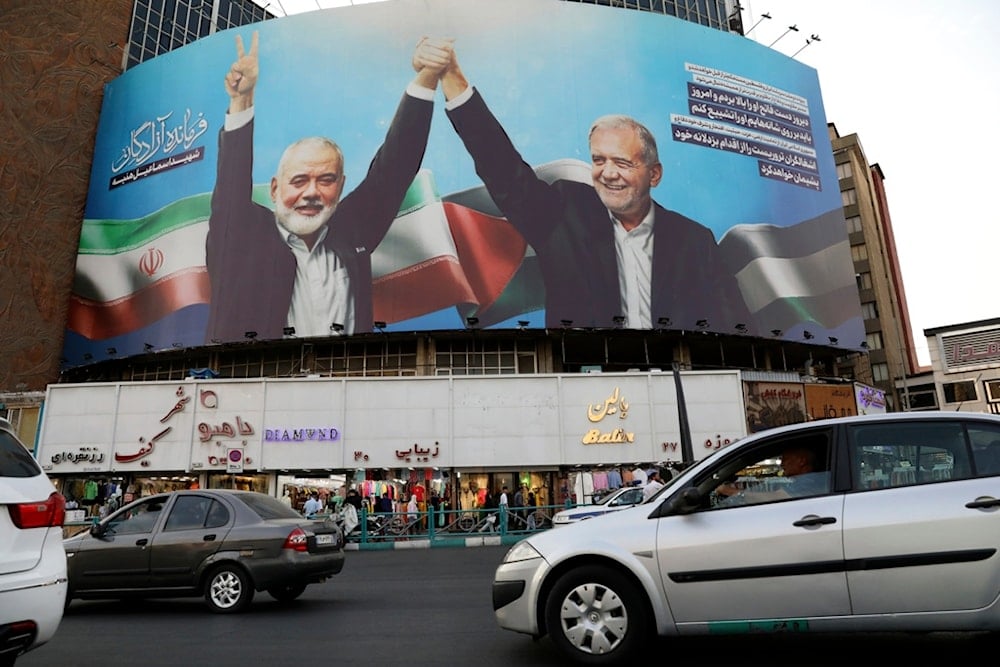Western media: 'Israel' caught in quandary amid psychological warfare
Western media outlets agree that Iran is waging psychological warfare against "Israel" regarding its expected response, deliberately maintaining complete silence regarding the timing and quality of the response, keeping "Israel's" military, security, and logistical capabilities on the brink, while depriving the settlers of any sense of security.
-

Vehicles drive past a banner showing the martyred Hamas leader Ismail Haniyeh joining hands with Iranian President Masoud Pezeshkian, in a square in downtown Tehran, Iran, August 5, 2024. (AP)
The American newspaper The Wall Street Journal reported, citing informed sources, that "Israel" has raised its military alert level to its highest for the first time this month, following observations of preparations by Iran and Hezbollah for potential large-scale operations.
WSJ stated that while "Israel" is unsure whether the retaliatory operations are imminent, it is acting cautiously.
The journal further cited Defense Secretary Lloyd Austin saying that the USS Abraham Lincoln Carrier Strike Group, currently in the South China Sea, is moving rapidly towards the region because Washington wants it "to the capabilities of the USS Theodore Roosevelt Carrier Strike Group already in the region."
The WSJ also confirmed that Iran "has kept diplomats guessing about its plans this time, raising concerns that damage caused by an Iranian strike, or an Iranian miscalculation of how Israel would respond to one, could set off a new round of escalation."
In turn, the Financial Times reported that "almost every day, a new threat emerges from a senior Iranian political or military figure." The Islamic Revolution Guard Corps has announced new military drills, but there is no evidence regarding the specifics of how or when a response might occur. According to a source, this uncertainty is exactly what the Iranian leadership desires.
The article further suggested that Iran is conducting a psychological warfare campaign to keep Israeli occupation forces, security, and logistical capabilities on edge, depriving Israelis of any sense of calm.
Similarly, BBC correspondent Nafiseh Kohnavard reported that a US military official stated that US forces in the Middle East have been anticipating Iranian and Hezbollah retaliation since Saturday.
Kohnavard added, "No one seems to know when. Or even if…" an attack might occur. She noted that although there is heightened anticipation, particularly since US Defense Secretary Lloyd Austin ordered ships to speed up their movement, there are no specific indicators that an attack is imminent.
US forces in the Middle East have been standing by expecting that Iran & Hezbollah retaliation to happen since Saturday. “No one seems to know when. Or even if…” A US military official tells me
— Nafiseh Kohnavard (@nafisehkBBC) August 12, 2024
I had asked if there have been any extra indications that the attack may happen…
Additionally, Shashank Joshi, defense editor at The Economist, confirmed that part of Iran's goal is psychological intimidation, placing "Israel" in a difficult dilemma. Joshi posted, on X, that if "Israel" raises the alarm too early, it risks exacerbating the psychological intimidation, potentially causing Iran to alter its plans and delay its response to increase its impact and duration. Conversely, if "Israel" delays raising the alarm, the harm to its settlers could be greater.
Tricky dilemma for Israel. Part of Iran’s aim is psychological intimidation. If Israel sounds the alarm too early it risks compounding that. Iran can then also change plans, delay & prolong the effect. If Israel goes too late, then greater risk of disruption & harm to civilians. https://t.co/2oLogomt0j
— Shashank Joshi (@shashj) August 12, 2024
It is also important to note that the Israeli occupation's military spokesperson Daniel Hagari confirmed in a press conference that "Israel" is monitoring developments from its adversaries, specifically Hezbollah and Iran. He stated that there has been no change in the current defense instructions for the home front.
Read more: Iran will respond to 'Israel', not to succumb to bullying: Pezeshkian

 3 Min Read
3 Min Read








